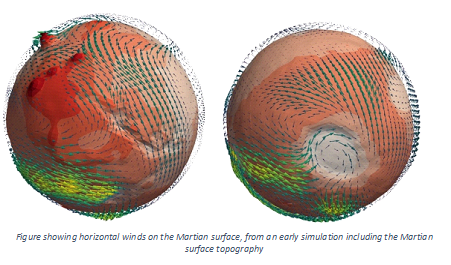(Exo)planet climatology [Mayne 2023]
(Exo)planet climatology
Supervisor: Professor Nathan Mayne
The Exeter Exoplanet Theory Group (EETG, exoclimatology.com) is a multi-disciplinary research group focused on the study of planetary climates. Our work combines state-of-the-art numerical models with cutting-edge observational data to attack puzzles spanning gas giant and terrestrial or rocky exoplanets. Much of our work involves close collaboration with the Met Office, through shared software development, and interaction/exchange of people and knowledge.

Project Questions: Current research of the EETG focuses on both terrestrial or rocky exoplanets, and gas giants, as well as solar system planets. The exact focus of this PhD post is flexible, with potential pathways detailed below.
Gas Giants: The most observationally constrained exoplanets are gas giants in short-period orbit, termed hot Jupiters (HJ) and a subset of these termed Ultra-Hot Jupiters (UHJs). These objects share parameter space with low-mass, self-luminous stellar analogues termed Brown Dwarfs (BDs). As the next generation of facilities comes online, such as JWST and Ariel, comparing the new high-precision observations with high-resolution and physically detailed models will be vital in using these objects to unravel the processes of planet and BD formation and evolution. Additionally, HJs and UHJs are known to have much larger radii than fundamental theories predict. A potential solution to this has been provided through a large-scale circulation connecting the radiative outer atmosphere and the deep interior convection (Tremblin et al., 2017). Developing treatments combining these two regimes will be vital to understanding these objects, and could also prove revolutionary for the study of solar system gas giants.
At EETG we are developing detailed simulations using both the current (Unified Model, UM) and next-generation (LFRic) 3D global circulation models (GCM) of the Met Office. Potential projects include the implementation of `high-temperature’ processes for UHJs, and coupling to a model of the convective interior of gas giant planets.
Terrestrial Planets: Understanding the major processes which controlled the climate evolution of Earth, Mars and Venus, and crucially why they diverged is vital in understanding the wider context of habitability in exoplanets. Determining whether distant, terrestrial, exoplanets are potentially habitable, and indeed inhabited requires understanding of the behaviour of many, important, physical processes, across a range of environments.
Project pathway for terrestrial planets would be centred on continued development of our Mars climate setup, and extending our understanding of the impact of flares and photochemistry to exoplanets and the early (Archean) Earth.
Environment & Skills: In this PhD project you would join a diverse group studying a range of exoplanet, solar system planet and Earth, climate problems. Access to ample high-performance-computing resources is available, alongside opportunities for training through the Met Office and University of Exeter's training programmes, and interaction with one of the worlds most sophisticated climate models. The successful candidate will have experience in programming (no specific language required but fortran and python are desirable), and an undergraduate degree in mathematics, physics or related discipline at UK 2:1 level or higher (or international equivalent).
For more information contact Professor Nathan Mayne
